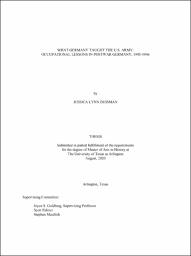
ATTENTION: The works hosted here are being migrated to a new repository that will consolidate resources, improve discoverability, and better show UTA's research impact on the global community. We will update authors as the migration progresses. Please see MavMatrix for more information.
Show simple item record
| dc.contributor.advisor | Goldberg, Joyce S. | |
| dc.creator | Buisman, Jessica Lynn | |
| dc.date.accessioned | 2020-09-09T20:59:03Z | |
| dc.date.available | 2020-09-09T20:59:03Z | |
| dc.date.created | 2020-08 | |
| dc.date.issued | 2020-08-11 | |
| dc.date.submitted | August 2020 | |
| dc.identifier.uri | http://hdl.handle.net/10106/29364 | |
| dc.description.abstract | The study of the U.S.-occupation of Germany after the Second World War is not complete without understanding its role in changing the culture of the U.S. Army. Statesmen at the wartime conferences determined what policies the Army should implement in Germany, but
these proved to be too impossible for the U.S. Army to carry out. The military directive, JCS 1067, emphasized denazification, democratization, and reeducation. U.S. policymakers in
Washington envisioned U.S. troops executing these policies without hesitation. This expectation proved faulty as the occupation entered its first year. Denazification, democratization, and
reeducation each failed due to a lack of communication, both within the Army command structure and between government agencies. Significantly, the troops themselves were dissatisfied with their role in the occupation. Additionally, GIs believed the Army’s demobilization was moving at too slow a pace. In response to increasing discontent, GIs
protested, demonstrated, and resisted in a very loud, very public, very undisciplined manner. Non-fraternization policies greatly contributed to low morale. Instead of protesting this policy, soldiers overtly ignored it and interacted with Germans as they pleased. U.S. Army leaders appeared appalled at the behavior of their troops and leaders such as Dwight D. Eisenhower and Lucius D. Clay acted to regain control over the soldiers. Eisenhower sought ways to better understand the needs of the troops. Clay created morale-boosting programs to divert the GIs’ attention from their roles as occupiers. While the U.S. Army and Congress ultimately modified the non-fraternization policy. These changes reflected both the actions of the soldiers on the ground and the lack of communication that had prompted them to act. What may have appeared to be concessions to soldier dissatisfaction became the beginning of a larger cultural change within the U.S. Army. | |
| dc.format.mimetype | application/pdf | |
| dc.language.iso | en_US | |
| dc.subject | U.S. Army | |
| dc.subject | Postwar | |
| dc.subject | Occupation | |
| dc.subject | Germany | |
| dc.subject | Culture | |
| dc.title | What Germany Taught the U.S. Army: Occupational Lessons in Postwar Germany, 1945-1946 | |
| dc.type | Thesis | |
| dc.degree.department | History | |
| dc.degree.name | Master of Arts in History | |
| dc.date.updated | 2020-09-09T20:59:04Z | |
| thesis.degree.department | History | |
| thesis.degree.grantor | The University of Texas at Arlington | |
| thesis.degree.level | Masters | |
| thesis.degree.name | Master of Arts in History | |
| dc.type.material | text | |
| dc.creator.orcid | 0000-0001-8693-9059 | |
Files in this item
- Name:
- BUISMAN-THESIS-2020.pdf
- Size:
- 2.399Mb
- Format:
- PDF
This item appears in the following Collection(s)
Show simple item record


